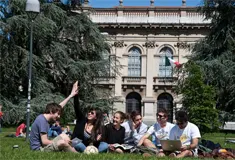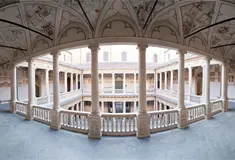
Italy is a popular destination for international students. It offers quality higher education with more affordable tuition fees than other Western European countries. There are around 32,000 international students in Italy, adding to the diversity of the country. With a rich history and tradition of higher education, Italy is always an attractive option for students.
Italy has a long history of higher education, with some of the first European universities being founded in Italy during the Middle Ages and Renaissance period. The University of Bologna, founded in 1088, is recognised as the oldest university to still operate. Today, Italy is the home of many universities that perform well in the QS World University Rankings, appearing in the top 200 each year.
Italy has played an important role in the reform of contemporary higher education. This reform is called the Bologna Process. They are also one of the four countries that created the European Area of Higher Education. This was formed by signing the Sorbonne Declaration in 1998, which was to be the first step in the higher education reform. Today the Bologna Process and is now being implemented throughout Europe. Italy also follows ECTS. These two processes mean that any qualification awarded by an Italian university is recognised throughout Europe, which is useful for your further studies or career opportunities.
Italy is a beautiful country, and has something for everyone. Its size and shape means that you can experience climates of all kind, and enjoy activities that range from skiing in the Alpes to relaxing on the beaches of Sorrento. The country is home to stunning old cities and breathtaking natural views. It is known for it’s fantastic food and wine, as well as its passionate people. At the same time, it is among the 8 most industrialised countries in the world, hosting many of the world’s biggest companies and research facilities. Italy has a rich cultural tradition and history as well as many World Heritage Sites that you can visit during your stay.
The top tourist attractions in Italy include:
As well as these famous tourist attractions, there are many exciting cities around Italy. Popular student cities include Rome, Milan, Florence and Venice.
| Continent | Europe |
|---|---|
| Language(s) of tuition | English, Italian |
| Universities on StudyLink | 41 universities |
| Major Student Cities | Rome (capital), Milan, Florence, Venice |
Design Thinking for Business Transformation Summer School
IED – Istituto Europeo di Design Italy
Find out moreCan I study in Italy for free?
Higher education in Italy is not government subsidised, meaning that universities can set their own tuition fees. However, fees are generally affordable for international students looking to study abroad.
Can I study in Italy as an international student?
Italy is a superb place to study as an international student. It has long been a popular destination for studying abroad, and can offer excellent higher education at reasonable prices. If you are from an EU or EFTA country, you will not need a visa to study in Italy. If you are from any other country, you will need to obtain a visa in order to study or stay in Italy. For more information about this and the application process, take a look at our Italian Student Visas article.
Can I study in Italy with English?
Many universities offer their courses in English as well as Italian, meaning you can choose which language you wish to study in. If your first language is not English, you will need to provide evidence of your language proficiency. Most Italian universities accept an IELTS or TOEFL certificate.
Applying to a university in Italy is a relatively straightforward process. Most universities will accept direct applications from international students. Some universities do participate in a more centralised application system, but not all. You will most likely pay an application fee for each university you apply to.
Common application requirements for a bachelors or masters degree in Italy include:
You might be required to have any documents translated into Italian, depending on the universities you are applying to.
More information about applying for Italian universities can be found on our Degrees and Masters in Italy pages.
Italy uses the Euro (€) as its currency.
Tuition fees for international students in Italy vary, but are generally affordable, especially compared to other European countries. Many Italian universities are public, meaning that they are state-funded and their tuition fees are lower. Private universities are not funded by the government, and will therefore charge higher tuition fees, particularly for international students.
Students from the EU/EEA or EFTA normally pay the same as domestic Italian students, international students will pay more. A bachelors degree at a public university usually costs between €900 and €4,000 per year. At a private university, a bachelors degree can cost between €6,000 and €20,000 per year.
In terms of living costs, the amount you should think about budgeting will depend on where you choose to live. The University of Siena suggests that you budget for between €800 and €2,000 per month. This will cover your rent, groceries, bills, transport, and any other necessary expenses.
Another cost that you need to consider as an international student is health insurance. If you are an EHIC card holder, you will be able to access the same healthcare as Italian residents. If you do not hold an EHIC card, you will be required to have a valid health insurance.
International students who want to study in Italy will need to obtain a valid student visa. This is called a Visa Type D if your degree program lasts more than three months. If you are from a EU or EFTA (European Free Trade Association) you will not need a student visa, but will be required to register for a residence permit once you have arrived in Italy.
You can find more information about applying for an Italian student visa or residence permit on our Italy Student Visa Guide.
The national language of Italy is Italian.
Degrees are offered in Italian and English at most universities in Italy. If your course is taught in a language that is not your first language, you will need to provide evidence of your proficiency. This can be done through IELTS and TOEFL test results for English taught courses, and CELI or CILS for Italian taught courses.
If you do not meet the requirements for your course, most universities offer language courses, which will help you to improve. Developing your language skills is useful for everyday communication, and can also increase your post-graduate employment opportunities.

Politecnico di Milano campus, Milan

University of Padua campus, Padua
Join the StudyLink email list and never miss a chance to turn your study abroad dreams into reality!
